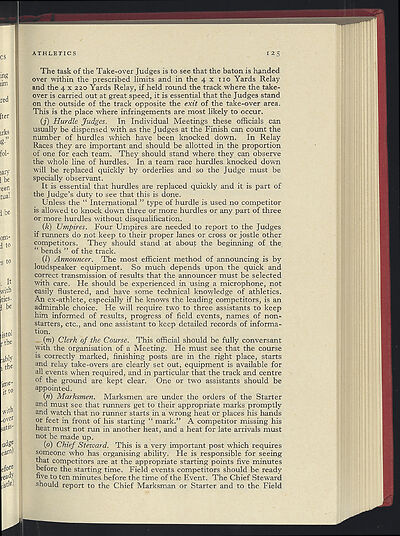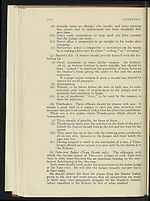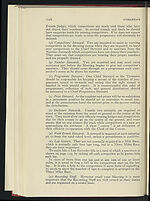1950-51
(141)
Download files
Complete book:
Individual page:
Thumbnail gallery: Grid view | List view

CS
ing
dni
red
fter
irks
�g,
fol-
iary
1 be
leer
tual
1 be
om-
d to
.
s
to
It
with
ties.
be
istol
r the
a
bly
the
hpe-
it to
with
ov
er
at
i
s
,
tIdg
e
CO)
ATHLETICS 125
The task of the Take-over Judges is to see that the baton is handed
over within the prescribed limits and in the 4 x IIo Yards Relay
and the 4 x 220 Yards Relay, if held round the track where the take-
over is carried out at great speed, it is essential that the judges stand
on the outside of the track opposite the
exit
of the take-over area.
This is the place where infringements are most likely to occur.
(j) Hurdle ,fudges.
In Individual Meetings these officials can
usually be dispensed with as the judges at the Finish can count the
number of hurdles which have been knocked down. In Relay
Races they are important and should be allotted in the proportion
of one for each team. They should stand where they can observe
the whole line of hurdles. In a team race hurdles knocked down
will be replaced quickly by orderlies and so the judge must be
specially observant.
It is essential that hurdles are replaced quickly and it is part of
the Judge's duty to see that this is done.
Unless the " International " type of hurdle is used no competitor
is allowed to knock down three or more hurdles or any part of three
or more hurdles without disqualification.
(k) Umpires.
Four Umpires are needed to report to the Judges
if runners do not keep to their proper lanes or cross or jostle other
competitors. They should stand at about the beginning of the
" bends " of the track.
(l) Announcer.
The most efficient method of announcing is by
loudspeaker equipment. So much depends upon the quick and
correct transmission of results that the announcer must be selected
with care. He should be experienced in using a microphone, not
easily flustered, and have some technical knowledge of athletics.
An ex-athlete, especially if he knows the leading competitors, is an
admirable choice. He will require two to three assistants to keep
him informed of results, progress of field events, names of non-
starters, etc., and one assistant to keep detailed records of informa-
tion.
- (m) Clerk of the Course.
This official should be fully conversant
with the organisation of a Meeting. He must see that the course
is correctly marked, finishing posts are in the right place, starts
and relay take-overs are clearly set out, equipment is available for
all events when required, and in particular that the track and centre
of the ground are kept clear. One or two assistants should be
appointed.
(n) Marksmen.
Marksmen are under the orders of the Starter
and must see that runners get to their appropriate marks promptly
and watch that no runner starts in a wrong heat or places his hands
or feet in front of his starting " mark." A competitor missing his
heat must not run in another heat, and a heat for late arrivals must
not be made up.
(o) Chief Steward.
This is a very important post which requires
someone who has organising ability. He is responsible for seeing
that competitors are at the appropriate starting points five minutes
before the starting time. Field events competitors should be ready
five to ten minutes before the time of the Event. The Chief Steward
should report to the Chief Marksman or Starter and to the Field
ing
dni
red
fter
irks
�g,
fol-
iary
1 be
leer
tual
1 be
om-
d to
.
s
to
It
with
ties.
be
istol
r the
a
bly
the
hpe-
it to
with
ov
er
at
i
s
,
tIdg
e
CO)
ATHLETICS 125
The task of the Take-over Judges is to see that the baton is handed
over within the prescribed limits and in the 4 x IIo Yards Relay
and the 4 x 220 Yards Relay, if held round the track where the take-
over is carried out at great speed, it is essential that the judges stand
on the outside of the track opposite the
exit
of the take-over area.
This is the place where infringements are most likely to occur.
(j) Hurdle ,fudges.
In Individual Meetings these officials can
usually be dispensed with as the judges at the Finish can count the
number of hurdles which have been knocked down. In Relay
Races they are important and should be allotted in the proportion
of one for each team. They should stand where they can observe
the whole line of hurdles. In a team race hurdles knocked down
will be replaced quickly by orderlies and so the judge must be
specially observant.
It is essential that hurdles are replaced quickly and it is part of
the Judge's duty to see that this is done.
Unless the " International " type of hurdle is used no competitor
is allowed to knock down three or more hurdles or any part of three
or more hurdles without disqualification.
(k) Umpires.
Four Umpires are needed to report to the Judges
if runners do not keep to their proper lanes or cross or jostle other
competitors. They should stand at about the beginning of the
" bends " of the track.
(l) Announcer.
The most efficient method of announcing is by
loudspeaker equipment. So much depends upon the quick and
correct transmission of results that the announcer must be selected
with care. He should be experienced in using a microphone, not
easily flustered, and have some technical knowledge of athletics.
An ex-athlete, especially if he knows the leading competitors, is an
admirable choice. He will require two to three assistants to keep
him informed of results, progress of field events, names of non-
starters, etc., and one assistant to keep detailed records of informa-
tion.
- (m) Clerk of the Course.
This official should be fully conversant
with the organisation of a Meeting. He must see that the course
is correctly marked, finishing posts are in the right place, starts
and relay take-overs are clearly set out, equipment is available for
all events when required, and in particular that the track and centre
of the ground are kept clear. One or two assistants should be
appointed.
(n) Marksmen.
Marksmen are under the orders of the Starter
and must see that runners get to their appropriate marks promptly
and watch that no runner starts in a wrong heat or places his hands
or feet in front of his starting " mark." A competitor missing his
heat must not run in another heat, and a heat for late arrivals must
not be made up.
(o) Chief Steward.
This is a very important post which requires
someone who has organising ability. He is responsible for seeing
that competitors are at the appropriate starting points five minutes
before the starting time. Field events competitors should be ready
five to ten minutes before the time of the Event. The Chief Steward
should report to the Chief Marksman or Starter and to the Field
Set display mode to:
![]() Universal Viewer |
Universal Viewer | ![]() Mirador |
Large image | Transcription
Mirador |
Large image | Transcription
| Games and sports in the army > 1950-51 > (141) |
|---|
| Permanent URL | https://digital.nls.uk/248809321 |
|---|
| Description | 'Games and Sports in the Army' was an annual publication produced by the British War Office between the 1930s and 1960s. This included the Second World War. It outlines the rules and regulations for games and sports played by members of the armed forces. It features names and photographs of team members, and examples of contemporary advertising. |
|---|---|
| Shelfmark | GWB.52 |

